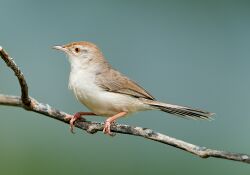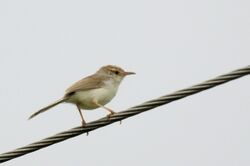Biology:Rufous-fronted prinia
| Rufous-fronted prinia | |
|---|---|

| |
| In Rajasthan, India | |
| Scientific classification | |
| Domain: | Eukaryota |
| Kingdom: | Animalia |
| Phylum: | Chordata |
| Class: | Aves |
| Order: | Passeriformes |
| Family: | Cisticolidae |
| Genus: | Prinia |
| Species: | P. buchanani
|
| Binomial name | |
| Prinia buchanani Blyth, 1844
| |
The rufous-fronted prinia (Prinia buchanani) is a species of bird in the family Cisticolidae. It is found in India and Pakistan . Its natural habitat is subtropical or tropical dry forest.
The species was described by Edward Blyth on the basis of an illustration of the bird from Bengal in the collections of Buchanan Hamilton.[2]
Description
The rufous-fronted prinia is a small stocky bird, generally 12 cm long and weighing between 5 and 6 grams. The upper parts are sandy color. The lower parts are off-white. The legs and toes are pink. Remiges and tail feathers are also sandy color. The underside of the tail is creamy white. The head is olive brown, and the bird has a pale eyebrow and a thin red eye circle. The beak is a classic insectivore, thin and slightly curved, and the eyes are reddish-orange.
Reroduction
The nest is made of strips of grass woven together. It is built at one or two meters from the ground. The female generally lays between two and four eggs.
Habitat and behavior
The rufous-fronted prinia is located in India and Pakistan . The species inhabits subtropical or tropical dry forest. It is also present in rocky areas, artificial land areas and dry open areas with sparse vegetation, such as plains and hills. It sneaks into the vegetation.
It is an insectivorous bird which feeds in the foliage or on the ground. It is a discreet bird that lets itself be approached. It emits a repetitive song from an exposed perch by wagging its tail.
They are mainly resident, migration is limited to local movements in cold weather. Non-breeding birds may form small flocks.[3]
Conservation status
The population is stable, it is considered by the IUCN as "least concern".[4]
References
- ↑ BirdLife International (2016). "Prinia buchanani". IUCN Red List of Threatened Species 2016: e.T22713581A94380984. doi:10.2305/IUCN.UK.2016-3.RLTS.T22713581A94380984.en. https://www.iucnredlist.org/species/22713581/94380984. Retrieved 12 November 2021.
- ↑ Blyth, Edward (1844). "Appendix to Mr. Blyth's Report for December Meeting, 1842". Journal of the Asiatic Society of Bengal 13: 361–395. https://www.biodiversitylibrary.org/page/40057203.
- ↑ "Prinia à front roux". https://ebird.org/species/rufpri2?siteLanguage=fr.
- ↑ "Rufous-fronted Prinia". https://www.iucnredlist.org/species/22713581/94380984.
Wikidata ☰ Q3726395 entry
 |



